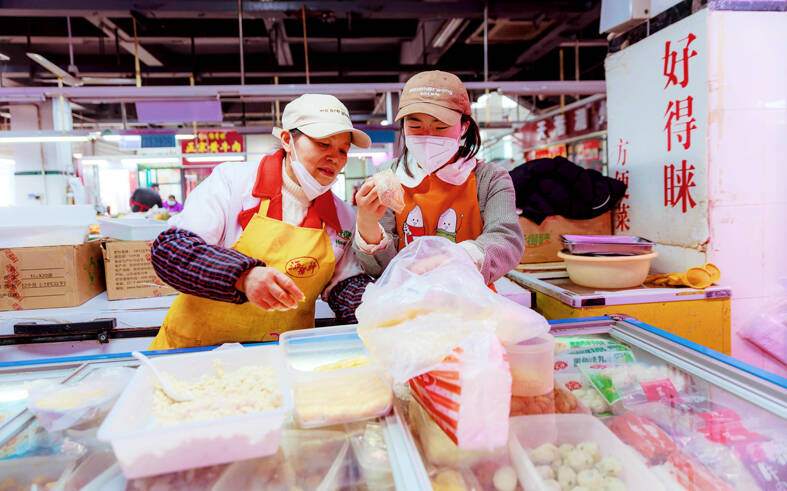China is not participating in a UN project to survey Asian wet markets and other facilities at high risk of spreading infectious diseases from wild animals to humans, despite long-running talks with Beijing, a UN official said.
China’s hesitancy to join the UN project involving other Asian nations might compound frustration by global researchers, who have been pressing Beijing to share information about the origins of COVID-19, as they seek to prevent future pandemics due to animal-to-human disease transmission.
Four Asian countries — China, Thailand, Vietnam and Laos — were initially selected for the survey by the scientific advisory committee of the project, called the Safety across Asia For the global Environment (SAFE), because they host multiple facilities presenting risks of animal-to-human disease transmission, the UN official said.

Photo: EPA-EFE
The selection for the project, launched in July 2021, was also made after major wildlife trafficking cases were detected, investigated and prosecuted in those countries, which increased zoonotic risks, the official said.
“China was initially in discussions to be part of the project,” the official said, declining to be named as the information was deemed sensitive.
The official said discussions with China are still ongoing, but did not clarify with which state institution the UN project is holding talks.
The Chinese Ministry of Foreign Affairs and the Chinese National Forestry and Grasslands Administration, which oversees the management of wildlife and was involved in initial talks with the project organizers, did not respond to requests for comment.
The official said the forestry agency initially showed interest in the project, but eventually declined to join, saying it was not under its remit.
The agency did not indicate which government agencies would be responsible for the matter, the official said.
The UN Office on Drugs and Crime, which monitors illegal wildlife trafficking and coordinates the SAFE project, did not immediately comment.
After COVID-19 first emerged in the Chinese city of Wuhan in December 2019, many researchers suspected it spread in a live animal market there.
China has since banned the sale and consumption for food of wild animals.
Despite the ban, experts warn that risks still remain.
“There are glaring holes in the restrictions that still pose a zoonotic disease risk,” said Peter Li, a China policy specialist at Humane Society International, a US-based nonprofit organization.
He said China still allows wildlife breeding on a massive scale for the fur trade, traditional medicine, pet trade and entertainment or display in low-welfare conditions.
China’s public security agencies handled more than 70,000 criminal cases involving wild animals from 2020 to last year, confiscating 1.37 million wild animals in the process, Xinhua news agency reported.

CALL FOR SUPPORT: President William Lai called on lawmakers across party lines to ensure the livelihood of Taiwanese and that national security is protected President William Lai (賴清德) yesterday called for bipartisan support for Taiwan’s investment in self-defense capabilities at the christening and launch of two coast guard vessels at CSBC Corp, Taiwan’s (台灣國際造船) shipyard in Kaohsiung. The Taipei (台北) is the fourth and final ship of the Chiayi-class offshore patrol vessels, and the Siraya (西拉雅) is the Coast Guard Administration’s (CGA) first-ever ocean patrol vessel, the government said. The Taipei is the fourth and final ship of the Chiayi-class offshore patrol vessels with a displacement of about 4,000 tonnes, Lai said. This ship class was ordered as a result of former president Tsai Ing-wen’s (蔡英文) 2018

UKRAINE, NVIDIA: The US leader said the subject of Russia’s war had come up ‘very strongly,’ while Jenson Huang was hoping that the conversation was good Chinese President Xi Jinping (習近平) and US President Donald Trump had differing takes following their meeting in Busan, South Korea, yesterday. Xi said that the two sides should complete follow-up work as soon as possible to deliver tangible results that would provide “peace of mind” to China, the US and the rest of the world, while Trump hailed the “great success” of the talks. The two discussed trade, including a deal to reduce tariffs slapped on China for its role in the fentanyl trade, as well as cooperation in ending the war in Ukraine, among other issues, but they did not mention

HOTEL HIRING: An official said that hoteliers could begin hiring migrant workers next year, but must adhere to a rule requiring a NT$2,000 salary hike for Taiwanese The government is to allow the hospitality industry to recruit mid-level migrant workers for housekeeping and three other lines of work after the Executive Yuan yesterday approved a proposal by the Ministry of Labor. A shortage of workers at hotels and accommodation facilities was discussed at a meeting of the legislature’s Transportation Committee. A 2023 survey conducted by the Tourism Administration found that Taiwan’s lodging industry was short of about 6,600 housekeeping and cleaning workers, the agency said in a report to the committee. The shortage of workers in the industry is being studied, the report said. Hotel and Lodging Division Deputy Director Cheng

‘SECRETS’: While saying China would not attack during his presidency, Donald Trump declined to say how Washington would respond if Beijing were to take military action US President Donald Trump said that China would not take military action against Taiwan while he is president, as the Chinese leaders “know the consequences.” Trump made the statement during an interview on CBS’ 60 Minutes program that aired on Sunday, a few days after his meeting with Chinese President Xi Jinping (習近平) in South Korea. “He [Xi] has openly said, and his people have openly said at meetings, ‘we would never do anything while President Trump is president,’ because they know the consequences,” Trump said in the interview. However, he repeatedly declined to say exactly how Washington would respond in